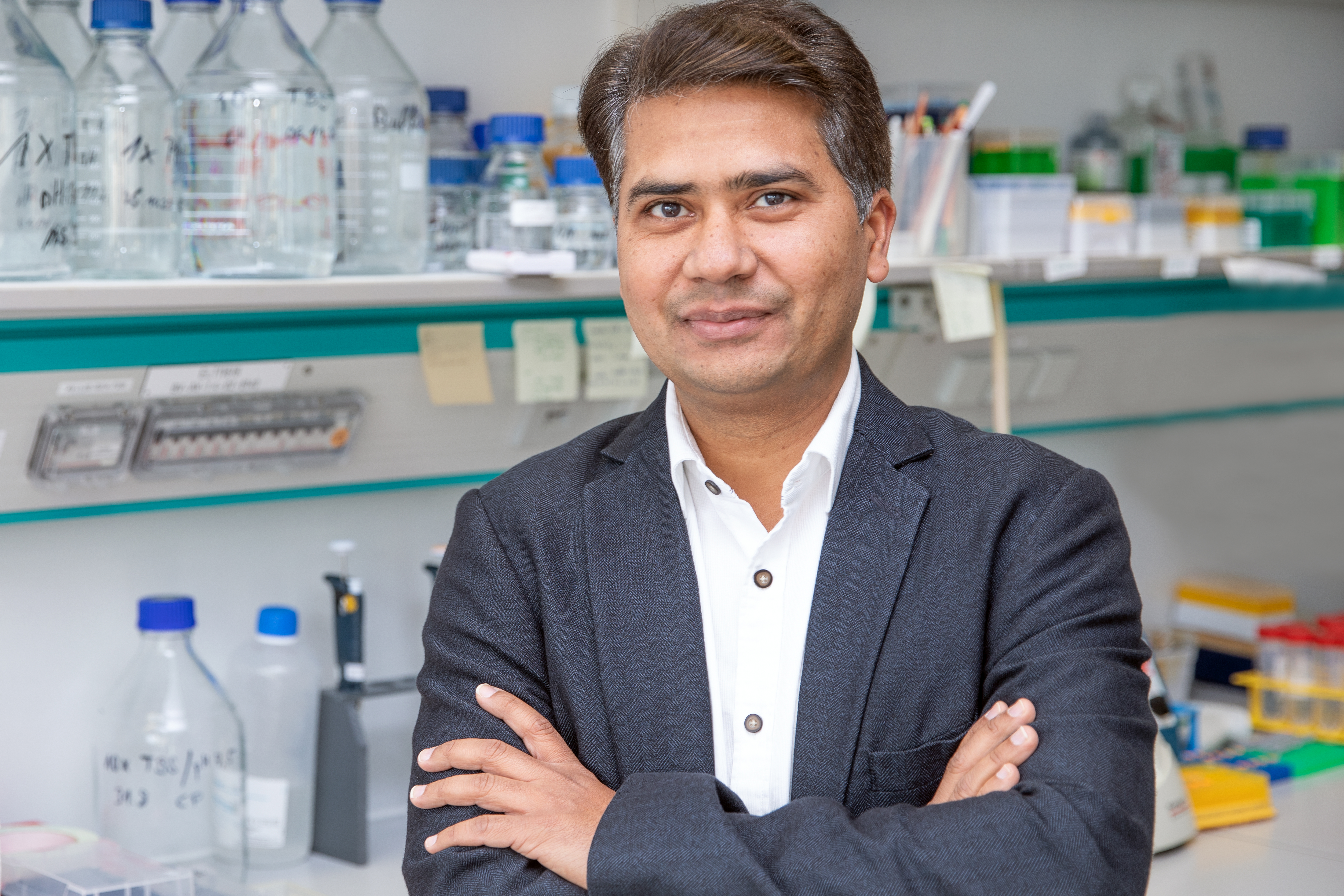The German Research Foundation (DFG) is funding Dr Amar Deep Sharma from the Department of Gastroenterology and supporting his research into RNA therapies for severe liver diseases.

Delighted with his award: Heisenberg Professor Dr Amar Deep Sharma. Copyright: Karin Kaiser / MHH
The use of ribonucleic acid (RNA) has found its way into medicine, at the latest with the development of vaccinations against COVID-19. But RNA can be used for more than just vaccinations. It is also a promising molecule for developing new therapies for a variety of diseases for which there is currently no cure – including cancer and cardiovascular diseases. Professor Dr Amar Deep Sharma, head of the "RNA Therapeutics & Liver Regeneration" working group at the Clinic for Gastroenterology, Hepatology, Infectiology and Endocrinology at Hannover Medical School (MHH), wants to use the potential of RNA to treat liver diseases. The molecular physician is using so-called messenger RNA (mRNA) for this purpose. With his project "Development of RNA-based therapeutics using cellular reprogramming and remodelling of liver cells", the researcher has been accepted into the coveted Heisenberg Programme of the German Research Foundation (DFG). By awarding the Heisenberg Professorship for "RNA Therapies for the Liver" on 1 October 2023, the DFG is recognising the outstanding quality of the scientist and supporting his research work with 780,000 euros over five years. "The award is proof of the excellence of his work and a great honour for us all," says Professor Dr Frank Bengel, MHH Dean of Research.
Key factor for liver metabolism
The mRNA copies the genetic information contained in our genetic material, the DNA. The copy then serves as a template for building proteins, the building blocks of life. In his research work, Professor Sharma uses mRNA to treat liver fibrosis. Fibrosis occurs when liver tissue is remodelled and scarred due to certain liver diseases. "Progressive fibrosis increasingly impairs liver function and can lead to liver cirrhosis and ultimately to liver failure or cancer," explains the scientist. In Europe, more than 150,000 people die from this every year.
Professor Sharma has been working on the development of therapeutic RNAs for eight years. He had his first successes with research into an mRNA that contains the blueprint for the so-called hepatocyte nuclear factor 4 alpha (HFN4α). This is an important key factor in liver metabolism. The protein activates the sugar, fat and protein metabolism as well as other important enzymes that play a central role in the conversion of exogenous substances such as drugs. In liver fibrosis, HFN4α levels have been shown to decrease as the disease progresses. "In studies on the mouse model and in human liver cells, we have already been able to show that the therapeutic mRNA can be used to restore HFN4α levels and thus reduce liver damage," explains Professor Sharma. This proves that small RNAs have the ability to suppress acute liver failure and chronic liver damage such as liver fibrosis.
Too few drugs for the treatment of liver fibrosis
"The lack of approved drugs that can effectively treat liver fibrosis requires the rapid development of new anti-fibrotic therapies," emphasises the scientist. Based on his previous research data, he would therefore like to find further mRNA therapy candidates for liver-specific diseases as well as non-coding RNAs that could control the regeneration of liver tissue. He also aims to investigate the development of liver fibrosis in more detail and to elucidate the biological correlations of the disease progression. However, the scientist is also keen to share his enthusiasm for RNA research and its therapeutic possibilities with students. "RNA therapeutics are the drugs of the future and have several advantages for patients, such as safety and efficacy compared to other approaches," explains Professor Sharma.
Keyword Heisenberg Professorship
With the Heisenberg Professorships, the DFG supports excellent researchers over a period of five years. The funding is intended to give promising young scientists the opportunity to establish a new field of research at their university and prepare themselves for a scientific leadership position. It is named after the German physicist Werner Heisenberg, who was awarded the Nobel Prize for Physics at the age of 31.
Text: Kirsten Pötzke